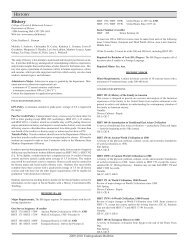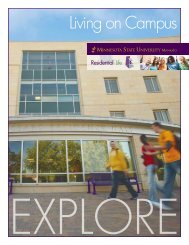The Polyglot - Minnesota State University, Mankato
The Polyglot - Minnesota State University, Mankato
The Polyglot - Minnesota State University, Mankato
Create successful ePaper yourself
Turn your PDF publications into a flip-book with our unique Google optimized e-Paper software.
November 2005<br />
Volume 5, Issue 2<br />
<strong>The</strong> <strong>Polyglot</strong><br />
<strong>Minnesota</strong> <strong>State</strong> <strong>University</strong>, <strong>Mankato</strong><br />
Department of Modern Languages Newsletter<br />
Contact us: 507-389-2116<br />
Table of Content:<br />
25 Years of French Study Abroad Program<br />
at <strong>Minnesota</strong> <strong>State</strong> <strong>University</strong>, <strong>Mankato</strong><br />
25 Years of<br />
Spanish Study<br />
Abroad 1<br />
Don Quixote<br />
Conference 2<br />
International<br />
Poetry Recital 3<br />
Spanish<br />
Students’ Poetry 3<br />
A Unique<br />
Perspective on<br />
the Recital 5<br />
News from<br />
Scandinavian<br />
Studies 6<br />
Spanish Movie<br />
Night 6<br />
Language Club<br />
News 7<br />
Faculty News 8<br />
Student News 8<br />
<strong>The</strong> Summer Study in France Program<br />
began in 1981. Initially students spent<br />
the last week or so of July visiting Paris<br />
and various sites around the French<br />
capitol. <strong>The</strong>y then went to La<br />
Rochelle where they spent the month<br />
of August living with French families<br />
and taking classes at the Institut<br />
d’Études Françaises. In 1983, the<br />
program changed a bit. Students<br />
began spending the last two weeks of<br />
June in Paris and Normandy and the<br />
month of July in La Rochelle.<br />
While in Paris, the students visit the<br />
following museums: Salvador Dali,<br />
Cluny (basically Medieval), Orsay, the<br />
Louvre, Carnavelet (the history of<br />
Paris), Picasso and Rodin. During their<br />
free time, they are able to visit other<br />
museums that interest them. <strong>The</strong>y also<br />
visit the following chapels, churches<br />
and cathedrals in and around Paris:<br />
Notre-Dame, Sainte-Chapelle, la<br />
Madeleine, la Trinité, Sacré-Cœur,<br />
Saint-Pierre, Saint-Etienne-du-Mont,<br />
Saint-Sulpice, Saint-Germain des Prés,<br />
Saint-Denis and Saint-Paul-Saint-Louis.<br />
Excursions are organized to these<br />
castles and palaces: Fontainebleau,<br />
Vaux-le-Vicomte and Versailles. <strong>The</strong>y<br />
also take a trip to Epernay where they<br />
tour the Castellane champagne<br />
producer and learn how this<br />
marvelous beverage is made.<br />
After ten days in Paris, the participants<br />
head for Normandy where they visit<br />
Giverny (site of Monet’s gardens and<br />
home) and the American Art Museum,<br />
the cities of Lisieux with its splendid<br />
basilica and Bayeux with its famous<br />
tapestry and cathedral, Arromanches<br />
with its D-Day museum and landing<br />
beaches, and the American<br />
Cemetery at Omaha Beach. <strong>The</strong>y also<br />
tour what is considered to be the<br />
eighth wonder of the world, the Mont-<br />
Saint-Michel.<br />
While in the beautiful port city of La<br />
Rochelle, participants enjoy wonderful<br />
weather, sandy beaches, bountiful<br />
seafood, weekend excursions and<br />
excellent courses in language, culture<br />
and contemporary civilization.<br />
Students who are interested in France<br />
and its rich culture and history can<br />
participate in the first two weeks of the<br />
program. <strong>The</strong>y do not have to speak<br />
French. More than 400 students have<br />
taken advantage of this program<br />
which is now in its twenty-sixth year.<br />
Many have gone twice and several<br />
have done so three times. Information<br />
is available in the office of the<br />
Department of Modern Languages<br />
(507-389-2116) or from Dr. Janc, the<br />
program’s only director (507-389-1817<br />
or john.janc@mnsu.edu).
<strong>Polyglot</strong> November 2005 Page 2 of 8<br />
Dr. Janc and some of the students in La Rochelle, France<br />
Congratulations on running this wonderful program!<br />
Don Quixote Across the Disciplines: Unraveling Myth(s)<br />
<strong>The</strong> conference was held on the MSU campus in the middle of October 2005. It opened with a Don Quixote<br />
Poetry Recital on Tuesday afternoon, October 11, where students and faculty read poems in Spanish from<br />
Cervantes’ masterpiece or poetry about Don Quixote. While Spanish clearly dominated this event, poems<br />
were also recited in German, French, Korean, Japanese and English. About 80 people attended the recital.<br />
<strong>The</strong> conference itself was unusual, unusual in the positive sense. As promised by the two main conference<br />
organizers, Dr. Kimberly Contag and Dr. Jim Grabowska, this was not the straightforward “academic”<br />
conference, but a fun academic conference that was truly interdisciplinary. While the audience and conference<br />
participants were treated to many interesting papers on a wide variety of topics and traditions, they<br />
were also invited to explore food, music and dancing from the period, courtesy of the MSU Music<br />
Department, to view Quixotic art created by MSU art students and to see a performance of Man of La<br />
Mancha by the MSU <strong>The</strong>atre Department. <strong>The</strong> conference came to an end at the Manchegan banquet,<br />
where diners were surprised by windmills on each table that elementary students at Jefferson Elementary<br />
School had created especially for this dinner and where diners were treated<br />
to Vihuela music performed by Philip Rukavina. While organizing a<br />
conference clearly is an exhausting task—and I came across visual<br />
evidence thereof the following Monday, when I found Jim Grabowska<br />
exhausted and lying on the floor in the main office (actually, he might<br />
have been photographing the windmills before returning them to the<br />
students)—this conference was very enjoyable to attend.<br />
Congratulations to everyone who helped make it a success!<br />
Post Conference<br />
Exhaustion
Page 3 of 8<br />
<strong>Polyglot</strong> November 2005<br />
International Poetry Recital, November 16, 2005<br />
Each Fall Semester, during International<br />
Education Week, Dr. Enrique Torner sends<br />
out a call for participation in the<br />
International Poetry Recital. This year, he<br />
found himself in the unusual situation of<br />
having to organize two poetry recitals, the<br />
Don Quixote Poetry Recital and the<br />
International Poetry Recital. With the<br />
wonderful technical support of Shirley<br />
Nieto-Flores, who created the power point<br />
presentations for both recitals that made it<br />
easier for the audience to follow along<br />
either in the original language or in<br />
translation. Both events were a great<br />
success! Thank you, Shirley and Enrique! I<br />
would also like to thank the sponsors of both<br />
recitals, the International Student Office,<br />
who provided refreshments, and the<br />
Department of Modern Languages, the<br />
Office of Institutional Diversity and Memorial<br />
Library.<br />
Each year, the International Poetry Recital<br />
attracts a diverse group of participants,<br />
students from the language classes at MSU<br />
who recite poems in the languages they<br />
study—this year students from Dr. Torner’s<br />
Readings in Spanish literature course read poems by Spanish<br />
authors or poems they themselves had written some of which<br />
are featured in this edition of the <strong>Polyglot</strong>; students from Dr.<br />
Tomany’s Norwegian and Swedish courses recited poems in<br />
a variety of Scandinavian languages, and students from Dr.<br />
Peterson’s ESL courses recited poems in their native<br />
languages. But participants are not only drawn from the<br />
language classes but come from the wider student and<br />
faculty body at MSU, or even the <strong>Mankato</strong> community.<br />
Students, faculty and community members recited poems in<br />
the following languages: Japanese, Spanish, Norwegian,<br />
Nynorsk (New Norwegian) and Danish-Norwegian, Creole,<br />
French, Swedish, Finnish, Korean, Yiddish, Nepali, English,<br />
German, Old Norse, Catalan, Middle High German, Latvian,<br />
and Dakota. As diverse as the languages were, so were the<br />
recitals of the poems. Ikars Justin Sarma lives in <strong>Mankato</strong> and<br />
recited his own poetry in Latvian. Particularly moving for me<br />
were the last two performances in the Poetry Recital in<br />
Dakota, those by Gwen Westerman Griffin, professor in the<br />
English Department and the Dakota Hymn beautifully sung<br />
and accompanied on the guitar by Mandy Nelson, Brittany<br />
Stephens and Rogene Crawford. But absolutely mindboggling<br />
was the performance by four-year old Luna Moreno<br />
who recited from memory the rather lengthy “El renacuajo<br />
paseador” by Rafael Pombo. She deserved the standing<br />
ovation given to her by the audience! Well done Luna!<br />
Poetry Written By Students of Dr. Torner’s Literature Class<br />
“Amor Incompleto”, by John Baquero<br />
Quiero besar sus labios, pero tengo miedo.<br />
Quiero tocar su mano, pero no puedo.<br />
Su cara parece similar a un gran angel,<br />
Como una suava manta, se parece su piel.<br />
No se si puedo hablar con alguien como usted.<br />
Me pongo nervioso cuando oigo su voz,<br />
La quiero mas y mas como estoy lleno de sed<br />
Cada dia que pase que no estoy con usted.<br />
“Incomplete Love”<br />
I want to kiss your lips, but I am afraid.<br />
I want to touch your hand, but I am unable to.<br />
Your face is that similar to an angel,<br />
Your skin is like a smooth blanket.<br />
I don’t know if I can talk with anyone, like I can with you.<br />
I get nervous when I hear your voice,<br />
I love you more and more like I am full of thirst<br />
Each day that passes that I am not with you.
<strong>Polyglot</strong> November 2005 Page 4 of 8<br />
“Palabras Congeladas”, by Summer Wenger<br />
Las palabras vuelan en círculos sobre mi cabeza<br />
y caen como granizo por el piso<br />
Me molesta el significado congelado<br />
Me molesta la calle única que usa mi maestro.<br />
Siempre estoy atrapado en un laberinto de palabras<br />
insignificantes<br />
Hay partes de mi cerebro que han estado muertas por<br />
años<br />
Las grietas del arte y del movimiento encubiertas de<br />
polvo<br />
Tengo una actitud para aprender<br />
Pero nadie me invita<br />
Tengo el regalo de una perspectiva única<br />
Pero nadie tuvo el gozo de abrir mis<br />
pensamientos<br />
Soy un creador de cosas tan bonitas<br />
¿Por qué no quieres ver mis creaciones?<br />
Finalmente es el fin de clase.<br />
Salgo por el corredor cuidadosamente<br />
Para no caer por el hielo sobre el piso.<br />
Voy por las calles a caminar libre de mi jaula<br />
“Operación no hambre”, by Cassie Fleischer<br />
Es la víspera de Todos los Santos<br />
Y llevo un traje que da mucho miedo.<br />
Mi plan es causar a los niños llantos<br />
Y robarles el dulce de los dedos.<br />
Sí, soy estudiante de la universidad,<br />
Pero no tengo nada y dulces quiero.<br />
Además, ellos van a darme su piedad<br />
Porque mi necesidad es sincera.<br />
“Helado”, by Sheila Shetka<br />
Helado<br />
Suave y frío,<br />
Dulce.<br />
¡Ah, chocolate!<br />
Helado<br />
En mi estómago.<br />
¡Qué bueno!<br />
¡Ah, chocolate!<br />
“Frozen Words”, by Summer Wenger<br />
<strong>The</strong> words fly in circles around my head<br />
And fall to the floor like hail<br />
<strong>The</strong>ir frozen significance bothers me<br />
<strong>The</strong> single road my teacher uses bothers me<br />
I am always trapped in a labyrinth of insignificant<br />
words<br />
<strong>The</strong>re are parts of my brain that have been dead<br />
for years<br />
<strong>The</strong> crevices of art and movement are covered<br />
in dust<br />
I have the ability to learn<br />
But no one invites me<br />
I have the gift of a unique perspective<br />
But nobody has the joy of opening my thoughts<br />
I am a creator of very beautiful things<br />
Why don’t you want to see my creations?<br />
Finally, class has ended<br />
I go out into the hall careful<br />
Not to fall on the ice on the floor<br />
I go out into the streets to walk free of my cage<br />
“Operation No Hunger”, by Cassie Fleischer<br />
It’s All Saints’ Day’s eve,<br />
And I am wearing a disguise which scares<br />
people to death.<br />
Mi plan is to make children cry,<br />
And steal sweets from their fingers.<br />
Yes, I am a college student,<br />
But I don’t have anything, and I want sweets.<br />
Besides, they are going to give me mercy,<br />
Because my need is sincere.<br />
“Icecream”, by Sheila Shetka<br />
Icecream,<br />
Soft and cold,<br />
Sweet.<br />
Ahh, chocolate!<br />
Icecream<br />
In my stomach.<br />
So gooood!<br />
Ahh, chocolate!
Page 5 of 8<br />
<strong>Polyglot</strong> November 2005<br />
A Unique Perspective On the Poetry Recital<br />
Robert Bly once said something to the effect that music goes directly to the gut while poetry must<br />
unfortunately first pass through the brain before it gets there. Being an avid fan of poetry recitals, I can attest<br />
that, even though hearing a poem read is far more preferable an experience than just reading one for<br />
yourself, it is not a given that the full impact of a poem reaches the heart as well as the sound does. By<br />
impact, I mean that a poem must, according to many accomplished practitioners of the art, make sense as<br />
well as sound and one that makes sense but does not please the ear is not exactly a respectable or<br />
significant exemplar of what poetry is about.<br />
It may well be that only a few are fortunate enough to witness a truly unique experience. Certainly, shaking<br />
hands with the president of the United <strong>State</strong>s is a rare experience, but it is not an entirely unique one, because<br />
there have been a goodly number of presidents, and a new one every four years or so. <strong>The</strong>refore, what I<br />
regard as a truly unique experience has to be one which has not happened before and may not happen<br />
again, I do hope I am wrong on the latter because there is no reason an event I had the privilege of<br />
witnessing recently cannot happen again.<br />
<strong>The</strong> International Poetry Recital held on November 16, 2005 at <strong>Minnesota</strong> <strong>State</strong> <strong>University</strong> in <strong>Mankato</strong>,<br />
<strong>Minnesota</strong> was just the kind of experience I am thinking of. Before I walked into the assembly place I had no<br />
inkling that a modestly advertised poetry recital would drawn an audience of close to 100 listeners. Well, this<br />
recital did, and the audience found an opportunity to hear some 50-odd poems presented by 41 readers in<br />
no less than18 different languages. In the face of these statistics, many a poetry recital could seem pale in<br />
comparison.<br />
<strong>The</strong> planners of this event deserve much praise. To enhance the ability of the audience to experience poetry<br />
more fully than is usual, they had wisely decided to use a Power Point presentation to project the texts of each<br />
and every poem on large screens bracketing the podium. What was even more special was that both the<br />
original text and its English translation were shown simultaneously on side-by-side screens. That gave each one<br />
present an opportunity to get the gist of what the poem has to say without extensive familiarity with the<br />
language of the original before hearing its music. I certainly found that most of<br />
the time I could close my eyes and concentrate on how the sounds<br />
underline the word images. Having captured ahead of time the core of the<br />
poem, I was able to enjoy the feast for the soul and mind that good poetry<br />
surely intends to provide.<br />
While it cannot detract from the most positive overall satisfaction gained<br />
from the event, it is possible there were some attendees whose enjoyment<br />
Ikars Justin Sarma is from<br />
Latvia and now resides in<br />
North <strong>Mankato</strong>. From an<br />
early age, he has written<br />
might have been limited, depending on their background, to a given fiction, in particular<br />
specific few of all the poems recited. I certainly found only a few cases<br />
poems, which he writes<br />
where I had to try to read both the texts during the recital, and that was so<br />
only for the lengthier pieces where there was not enough time for scanning in English and Latvian<br />
the text prior to its performance. <strong>The</strong> recital was a bold undertaking, and it<br />
would be nice to see it tried again. It deserves no criticism.<br />
and which have been<br />
published. He has won<br />
We must remind ourselves that poetry is, primarily and beyond all the nice<br />
things that are said about it, a performing art. Anyone who has not had the<br />
opportunity to hear a poem read to him or her out loud by someone else will<br />
never realize how that beats just reading it by yourself.<br />
Written by Ikars Justin Sarma<br />
prizes for his poetry. He<br />
thinks of himself as a<br />
student of poetry and<br />
languages more than<br />
being a poet.
<strong>Polyglot</strong> November 2005 Page 6 of 8<br />
News From Scandinavian Studies<br />
Classes in the spring (4 credits each)<br />
SCAN 299 <strong>The</strong> Vikings in Scandinavia and the British Isles (in English), MTWH 9-9.50.<br />
SCAN 499 Contemporary Scandinavian Film (in English), MW 1-2.50<br />
SCAN 102 Elementary Norwegian II<br />
SCAN 295 Elementary Swedish II<br />
Requirements for a BA Minor in Scandinavian Studies: 20 credits, for a Major: 32 credits. For information, contact<br />
maria-claudia.tomany@mnsu.edu<br />
Exchange Programs<br />
<strong>The</strong> Scandinavian Studies Program has been working with the International Programs Office on establishing<br />
exchange programs with the Telemarken <strong>University</strong> College in Norway and Halmstad <strong>University</strong> College in<br />
Sweden. From the fall of 2006 on, students can go and study in Norway or Sweden in programs lasting anywhere<br />
from two weeks to a year. All classes except language courses can be taken in English. Students will receive<br />
MSU credit for their studies abroad. Course offerings are varied and very interesting, ranging from wetland<br />
biology to outdoor sports management.<br />
Summer Programs in Scandinavia<br />
A number of Scandinavian universities offer summer programs to foreign students. Students can take classes in<br />
their majors and/ or intensive language courses. Some of the oldest and most successful programs are in<br />
Bergen, Uppsala, Reykjavik, and Kopenhagen but many smaller universities offer innovative and fun programs,<br />
too. <strong>The</strong> application deadlines are around February 1, 2006 for the coming summer. Any students interested in<br />
spending two to eight weeks on such a program can find forms, information, and help with the applications in<br />
Dr. Tomany's office (218 E).<br />
Scandinavian Students Skiing Retreat<br />
Every year, the Scandinavian Studies programs in the Midwest organize a skiing retreat in Eau Claire, WI. This<br />
year, it will take place from February 17-19, 2006. <strong>The</strong> Scandinavian Studies program supports every student who<br />
has taken a class in Scandinavian Studies during the school year, by covering transportation and the costs for<br />
the hostel in Eau Claire.<br />
Spanish Movie Night<br />
¡Hola amigos!<br />
Last September I started something called Spanish Film<br />
Night. My intent with this initiative is to expose students,<br />
especially students of Spanish, to significant films made in<br />
Hispanic countries within the last five to ten years. A group<br />
of us have been getting together every other Wednesday<br />
from 5:30-8:00 at the Casual Learning Lab (basement of<br />
the library) to watch a movie and, sometimes, to have a<br />
discussion afterwards. People who have been coming<br />
have improved their Spanish listening skills, have learned<br />
more about the culture of some Spanish speaking<br />
countries and have become familiar with very important<br />
personalities in the Spanish speaking world such<br />
as Ernesto “Che” Guevara. We would love to<br />
have you join us. Our last movie this semester will<br />
be on November 30th. We will be watching the<br />
Puerto Rican movie “Sudor Amargo” (2004). But,<br />
we will be back on February 8 th , 2006. Look for<br />
the announcements at the beginning of the<br />
semester or contact me. ¡Hasta pronto amigos!<br />
Submitted by Silvia M. Roca-Martínez<br />
silvia.roca-martinez@mnsu.edu
Page 7 of 8<br />
<strong>Polyglot</strong> November 2005<br />
Language Club News<br />
Scandinavian Club Activities<br />
On December 3, we will go to the Twin Cities to visit the Swedish-<br />
American Institute which is housed in the palace-like former<br />
home of an early Swedish immigrant. <strong>The</strong> holiday decorations are<br />
famous, as are their book- and gift store and the cafe. Birgitta<br />
Hendrickson, professor of Scandinavian languages and German<br />
at MSU until her retirement this summer, will give us a special<br />
guided tour!<br />
On December 8, we will have a Greta Garbo Evening and watch<br />
one of her great movies - a feast for all lovers of early Hollywood<br />
movies! Popcorn and soda will be served.<br />
December 13 is the day of Santa Lucia in Sweden. We will meet<br />
for a session of music exchange - bring any music you like, any<br />
style, Scandinavian or otherwise, and your ipods, portable cdplayers<br />
etc. and headphones so we can introduce each other to<br />
some new stuff. <strong>The</strong>re will be pizza, and for dessert the typical<br />
Swedish saffron buns ("lussekattor") of the Lucia Day.<br />
Tuesday (through Finals week) from 5:00-<br />
6:30 at the hub Café.<br />
Tysen Dauer, German Club Secretary<br />
French Club Activities<br />
<strong>The</strong> French Club had a game night on<br />
Sunday, October 16 and a movie night<br />
on Thursday, November 10 during which<br />
students watched "Les Choristes." It is<br />
planning a holiday party on Sunday,<br />
December 4.<br />
News from the ever-growing German Club<br />
Drinking their dark hot coffee after a hard day of studying,<br />
students greet each other with a hearty “Wie geht’s?” Both fluent<br />
and struggling speakers converse about sundry topics with fellow<br />
German Club members. This is a scene at German Club’s weekly<br />
conversation at the Hub Café. It remains our most attended<br />
event. Any and every topic is discussed: movies, current events,<br />
history, German culture and homework are just a few.<br />
Two Pretzel Fundraisers were held this semester with great<br />
success. You may have seen members of the German club<br />
selling the warm, soft, pretzels near Sandellas, Barnes and Noble<br />
or in the halls.<br />
“Language Clubs<br />
are made up of<br />
wonderful people<br />
with a genuine<br />
love for<br />
languages and<br />
cultures.”<br />
Other events this semester included an evening of bowling and<br />
an expression of environmental care with the club’s Adopt-A-<br />
Highway clean-up. Members at the recent movie night viewed<br />
Das Vergessen and enjoyed German style popcorn (with butter<br />
and sugar).<br />
German Club is also sponsoring a trip to the Twin Cities where<br />
members will dine on authentic German cuisine and explore the<br />
Minneapolis Institute of Arts. This will take place on December 4 th .<br />
Conversation will round out the semester with meetings every
Faculty News<br />
Dr. Kimberly Contag attendied El encuentro sobre la literatura ecuatoriana<br />
Alfonso Carrasco V, a writers conference, sponsored by the <strong>University</strong> of Cuenca<br />
in Cuenca, Ecuador November 21-25. She meet with Ecuadorian writers in<br />
preparation for her new research project on Fantasy and Realism in Ecuadorian<br />
Literature written since 1975.<br />
Department of Modern<br />
Languages<br />
227 Armstrong Hall<br />
<strong>Mankato</strong>, MN 56001<br />
USA<br />
Phone:<br />
507-389-2116<br />
Fax:<br />
507-389-5887<br />
E-Mail:<br />
evelyn.meyer@mnsu.edu<br />
Please visit<br />
the<br />
Department’s<br />
website at:<br />
http://www.mnsu.edu/<br />
modernlang/<br />
Dr. Jim Grabowska’s <strong>The</strong> Challenge to Spanish Nobility in the Fourteenth Century:<br />
<strong>The</strong> Struggle for Power in Don Juan Manuel's Conde Lucanor, 1335 has been<br />
published by Edwin Mellen Press.<br />
<strong>The</strong> press also offered the conference organizers a contract to publish in book<br />
form, selected papers from the Don Quixote conference held In October. Dr.<br />
Contag and Dr. Grabowska will edit this book.<br />
Dr. John J. Janc attended the fall conference of the <strong>Minnesota</strong> Council on the<br />
Teaching of Languages and Cultures on October 20-21 In Brooklyn Park. He<br />
served as show manager for the exhibits and gave two presentations. One dealt<br />
with what is going on in France today and the other dealt with the use of<br />
cohesive devices in language teaching.<br />
This summer Patricia Longwell traveled and studied in Spain. She visited friends in<br />
Valencia and Madrid, and spent several days in Sevilla and Palma de Mallorca.<br />
<strong>The</strong> most sensational tourist site was the Oceanografic in Valencia, a gigantic,<br />
new aquarium and sea world, which is well worth the four to five hours one<br />
needs to see everything.<br />
Dr. Evelyn Meyer’s article “Gender Erasures, Knightly Maidens and (Un)knightly<br />
Knights in Hartmann von Aue’s Iwein” has been accepted for publication by<br />
Neophilologus.<br />
She also gave a presentation at the Don Quixote conference on “<strong>The</strong> German<br />
Tradition: (Mis)Readings of Don Quixote,” a presentation she is currently revising<br />
for publication.<br />
Dr. Enrique Torner organized and led the Literary Translation Workshop, Upper<br />
Midwest Translators & Interpreters Association (A Chapter of ATA) 3rd Annual<br />
Conference (Bloomington, MN, September 24, 2005) and a Literary Translation<br />
Workshop: “Translating Don Quixote”, Don Quixote Across the Disciplines<br />
Conference, <strong>Minnesota</strong> <strong>State</strong> <strong>University</strong>, <strong>Mankato</strong>, October 14, 2005.<br />
His article “Translating for the Publishing Field” will appear in January 2006 in the<br />
ATA (American Translators Association) Chronicle.<br />
He also organized the Don Quixote and the International Poetry Recitals in<br />
October and November 2005 at MSU.<br />
POETRY RECITALS<br />
News From A Former Student<br />
Kelly Murphy, a 1995 graduate of MSU, received her bachelor's in Spanish and is still pursuing her academic goals.<br />
She is currently working on her master's in Linguistics at Arizona <strong>State</strong> <strong>University</strong> and hopes to continue on to obtain<br />
her Ph.D. Her thesis topic is Hawaiian Intonation in Hawaiian Creole English. "<strong>The</strong> professors at MSU in the Modern<br />
Languages department helped me build a strong foundation in language acquisition and analysis. Everything I<br />
have learned in my Spanish courses I have used in my master's courses in linguistics. I'll never forget the Don<br />
Quixote class I took from Dr. Contag! I participated in the Mexico study abroad program with Dr. Heise, which was<br />
an invaluable experience."<br />
Best wishes to you Kelly as you complete your Master’s degree and move on into a Ph.D. program!
















